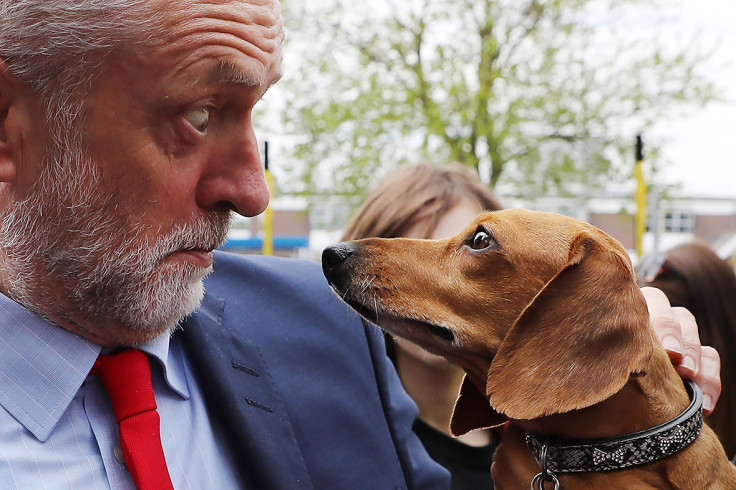Corbyn will lose because we're not all idealistic teenagers
Why isn't Jeremy heading for a victory? Because Labour's manifesto is an impossible spending wish-list.
Why, in a democracy, don't we just vote to give ourselves other people's money? Why doesn't representative government end in expropriation, social unrest and national bankruptcy? Ultimately, because voters are wiser than their political leaders suppose.
Consider Jeremy Corbyn's manifesto. His spokespeople are barely pretending that it's properly costed. When pressed on television about where the money is coming from, they go into rants about how unfair the media coverage is. (Everyone mentions poor Diane Abbott in this context, but the performance of Richard Burgon, who blew up on Newsnight last week when he was asked a couple of polite questions, was every bit as revealing.)
Labour's manifesto is an impossible wish-list of spending commitments: £6 billion more for the NHS, £8 billion more for social care, £8.5 billion more for schools, no more tuition fees, a million new homes, renationalisation of the railways, buses, Royal Mail and energy companies, a new £250 billion National Investment Bank, a free unicorn for everyone on their sixteenth birthday.
How could voters possibly object? The only people supposedly paying for this stuff are "the rich" and "the corporations". So why wouldn't you vote to give yourself all those goodies? Why isn't Jeremy Corbyn heading for a landslide victory? Because, presumably, most of us don't believe him. We understand that, just as we have to live within our means, so do governments.
It's true that, from time to time, electorates forget this, voting for higher spending and lower taxes and, in effect, bankrupting their states. Something of that sort happened in Greece in the run-up to the crash. It could happen in California. But these breakdowns are the exceptions, and serve as warnings to the rest of us.
The self-restraint of most voters is, in its way, quite extraordinary. Opposition to popular rule is as old as Western civilization, finding its first expression in the works of Plato. A mainstay of the anti-democratic argument that voters are too ill-educated, ignorant and impetuous to act in their own interest. Lord Derby, the long-serving nineteenth-century Tory leader, opposed widening the franchise on grounds that it would be like running a company on the basis that every shareholder had the same vote, regardless of the size of his holding.
The idea that voters are too dim to be trusted has never entirely gone away. Richard Dawkins and A.C. Grayling have been so upset by the Brexit vote that they have taken to arguing against allowing the general population to take important decisions. "Popular opinion is not always right," says the cult Slovenian philosopher Slavoj Zizek. "Sometimes I think one has to violate the will of the majority."

No less a figure than José Manuel Durrão Barrso, President of the European Commission when the euro crisis erupted, agreed. "Governments are not always right. If governments were always right we would not have the situation that we have today. Decisions taken by the most democratic institutions in the world are very often wrong."
And yet democracies tend to be wealthier, happier and freer than any other type of country. Look around the world at the alternatives. Would you rather live in the United States or in Cuba? In Israel or in Iran? In South Korea or in North Korea? The reason that democracy correlates with high GDP is not that it is perfect, but that it preferable to oligarchy – which, if you think about it, is the only alternative system, though it comes in monarchical, communist, fascist, theocratic and other varieties. Voters en masse will sometimes get things wrong, but at least they are trying to maximise their own interests. In states where power is hoarded by an elite, that elite will end up running the state for itself.
Sure, there are people in every country who are bad at carrying out cost-benefit analysis. Some of these people can be found at Jeremy Corbyn's rallies – including the young festival-goers chanting "Oh, Jeremy Corbyn" at the Tranmere Rovers ground over the weekend. It's not clear how many of these youngsters live with their parents, and so don't really get the idea of paying for everything; though a survey in Germany found that 92 per cent of far Left activists were in this category.
As we get older, though, we realise certain things. We grasp, for example, that "Growth not austerity" is a facile thing to say – if it were that straightforward, surely everyone would have done it by now. We understand that the reason governments don't spray unlimited money around is not out of sadism or meanness, but because the money is limited.
As we get older, we understand that the reason governments don't spray unlimited money around is not out of sadism or meanness, but because the money is limited.
We eventually come to see that "tax the rich" is a slogan, not a growth plan. When the top one per cent pay 30 per cent of income tax, pushing them toward emigration or early retirement will simply mean that the rest of us have to pick up the bill.
Just as people grow up, so do nations. Greece went bust after years of being encouraged to look to the EU for every rise in life. If a country is treated as a dependent teenager, it will eventually vote like one. At the other end of the scale is ultra-democratic Switzerland, where local and national spending decisions are regularly decided by referendum. The result? The Swiss have a finer appreciation than any other electorate of how spending choices work, and their country is very rich and very well-governed.
If we want other countries to be more like Switzerland, we should trust their voters more, not less. What goes for teenagers, goes for electorates – give people more responsibility and they behave more responsibly. Or, as the great Indian economist Amartya Sen once put it, "Don't ask whether a nation is fit for democracy; it becomes fit through democracy".
Daniel Hannan has been Conservative MEP for the South East of England since 1999, and is Secretary-General of the Alliance of European Conservatives and Reformists. Follow : @danieljhannan
© Copyright IBTimes 2025. All rights reserved.





















